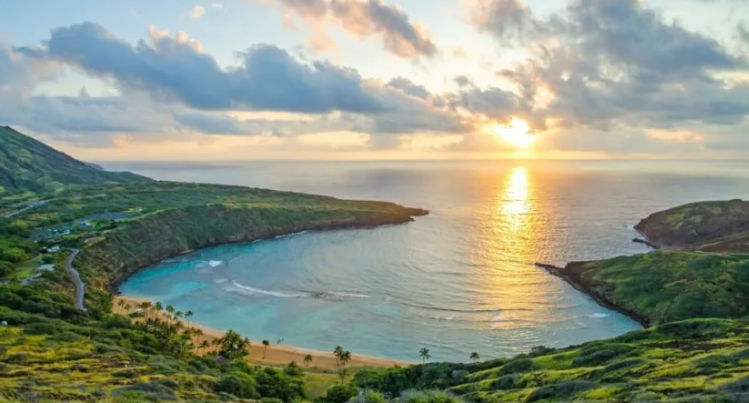Introducing Hawaii’s Green Tax Initiative
Beginning in 2026, Hawaii will introduce a green tax applied to tourism-related accommodations, marking a pioneering move in the U.S. This additional 0.75% levy on the existing Transient Accommodations Tax (TAT) seeks to raise approximately €85 million annually, dedicated entirely to safeguarding Hawaii’s natural environment.
What the Green Tax Means for Travelers
The tax affects stays in hotels, vacation rentals, and cruises, pushing the total accommodation TAT to 11%. For visitors, it may translate into a slight increase in their accommodation costs, but the benefit lies in reinvesting these funds into preserving the state’s ecological treasures and infrastructure against climate challenges.
Combating Environmental Challenges with Revenue
Hawaii’s tourism sector, while vital—accounting for about 25% of the state’s economy and attracting around 10 million visitors annually—has placed significant strain on its delicate ecosystems.
- Coastal erosion accelerated by heavy foot traffic and development
- Proliferation of invasive species that disrupt native flora and fauna
- Heightened vulnerability to severe weather events, as exacerbated by climate change
Events such as the devastating Maui wildfires in 2023 brought these issues into sharp focus, emphasizing the need for proactive measures. Funds collected through the green tax will underwrite projects like Waikiki beach re-silting to prevent erosion, removal of invasive grasses that fuel fires, and strengthening disaster preparedness and climate resilience across the islands.
Allocation of Tax Revenue
| Use of Funds | Purpose |
|---|---|
| Beach re-silting projects | Combat coastal erosion and preserve tourist spots |
| Invasive species removal | Restore native habitats and biodiversity |
| Climate disaster defense | Build resilience against hurricanes and wildfires |
Global Context: Tourism Levies as Environmental Tools
Hawaii joins a growing list of destinations embracing tourism-specific environmental levies. Countries like Italy (in cities such as Venice and Florence), Japan, Thailand, Peru, Turkey, Nepal, and France have introduced similar taxes designed to alleviate the pressures of mass tourism on nature and culture.
This global trend reflects a collective understanding that sustainable tourism is the way forward, balancing economic gains with environmental stewardship and cultural preservation.
Industry Reception and Next Steps
The introduction of the green tax has seen broad backing from Hawaii’s tourism sector. Many stakeholders recognize the need for sustainable practices to protect the archipelago’s unique allure. However, questions remain about whether a tax alone can curb the overall impact of mass tourism.
Complementary strategies are being explored, such as promoting eco-friendly activities and cultural preservation initiatives, ensuring tourism benefits both economy and environment alike.
What This Means for Transfers and Taxi Services
For operators and travelers in the transfer and taxi service sector, this move underscores an increased focus on sustainability. The expectation for eco-conscious services presents an opportunity to align offerings with environmental values, promoting electric or hybrid vehicle fleets and encouraging responsible travel behaviors.
A Blueprint for Sustainable Tourism Advancement
Hawaii’s green tax, although a localized policy, may well serve as a template for other states or regions grappling with environmental impacts from tourism. Its effectiveness will depend on how well the funds are managed alongside broader strategies for sustainable growth.
Önemli Çıkarımlar
- Green tax adds 0.75% to accommodation tax, generating €85 million annually
- Funds are dedicated to ecological restoration and climate resilience projects
- Tourism accounts for a quarter of Hawaii’s economy but strains natural resources
- Global examples show rising adoption of tourism levies to promote sustainability
- Complementary initiatives needed beyond taxation for long-term success
Why Personal Experience Matters in Tourism Choices
The discussion surrounding Hawaii’s green tax reveals how detailed reviews and transparent feedback shape traveler expectations, yet nothing beats firsthand experience. On platforms like LocalsRide, users can book rides from verified providers, ensuring reliable, personalized transfers. Access to a wide range of vehicles and clear pricing means travelers can make choices suited to their needs without surprises or extra costs.
By offering transparent information about vehicle types, driver ratings, and exact fares, platforms such as LocalsRide bring convenience and affordability to booking transfers. Travelers can explore Hawaii’s beautiful islands confidently, knowing their transportation supports a sustainable travel approach. En iyi teklifleri alın on transfers at LocalsRide.com.
In Summary
Hawaii’s green tax represents an innovative effort to fund environmental protection while maintaining a robust tourism industry. By increasing accommodation taxes slightly, the state aims to tackle coastal erosion, invasive species, and climate disaster preparedness, all pressing issues intensified by the influx of millions of visitors annually.
Such a targeted tax is part of a wider global movement recognizing the responsibility tourism destinations have to preserve their natural and cultural heritage. For travelers and transport providers, this tax signals a growing trend towards sustainable service offerings, including transfers and taxi rides that meet these evolving expectations.
Platforms like LocalsRide offer travelers the ability to book exact rides with trusted drivers, viewing all relevant details upfront — an invaluable asset in ensuring travel aligns with personal and environmental values. Whether heading from the airport or moving between Hawaiian sights, using such services adds transparency, convenience, and affordability to your journey.

